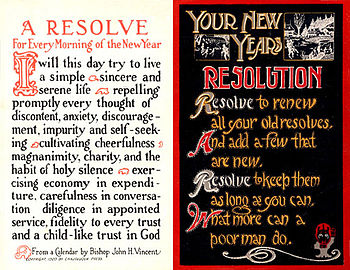New Year's resolution
This article has multiple issues. Please help improve it or discuss these issues on the talk page. (Learn how and when to remove these messages)
No issues specified. Please specify issues, or remove this template. |
A New Year's resolution is a commitment that an individual makes to one or more lasting personal goals, projects, or the reforming of a habit. According to Gretchen Rubin (author of best-seller "The Happiness Project"): "You hit a goal, you achieve a goal. You keep a resolution".
This lifestyle change is generally interpreted as advantageous. A New Year's Resolution is generally a goal someone sets out to accomplish in the coming year. Some examples include resolutions to donate to the poor more often, to become more assertive, or to become more environmentally responsible. A key element to a New Years Resolution that sets it apart from other resolutions is that it is made in anticipation of the New Year, and new beginnings.
There are religious parallels to this secular tradition. During Judaism's New Year, Rosh Hashanah, through the High Holidays and culminating in Yom Kippur (the Day of Atonement), one is to reflect upon one's wrongdoings over the year and both seek and offer forgiveness. People may act similarly during the Christian fasting period of Lent, though the motive behind this holiday is more of sacrifice than of responsibility. The concept, regardless of creed, is to reflect upon self-improvement annually.
Popular goals

Popular goals include resolutions to:[1][2]
- Improve health: lose weight, exercise more, eat better, drink less alcohol, quit smoking, stop biting nails
- Improve finances: get out of debt, save money
- Improve career: get a better job
- Improve education: improve grades, get a better education, learn something new (such as a foreign language or music), study often,
- Improve self: become more organized, reduce stress, be less grumpy, manage time, be more independent, perhaps watch less television, play less sitting-down video games
- Take a trip
- Volunteer to help others, practice life skills, use civic virtue, give to charity
For the year 2012, the top 5 resolutions, as identified by a SlideShare survey [3] are:
- Be financially-savvy
- Read at least one book per month
- Eat properly
- Get enough sleep
- Keep a journal of awesome moments
Success rate
Recent research shows that while 52% of participants in a resolution study were confident of success with their goals, only 12% actually achieved their goals. A separate study in 2007 by Richard Wisemen from the University of Bristol showed that 78% of those who set New Year resolutions fail, and those who succeed have 5 traits in common.[4] Men achieved their goal 22% more often when they engaged in goal setting, (a system where small measurable goals are being set; such as, a pound a week, instead of saying "lose weight"), while women succeeded 10% more when they made their goals public and got support from their friends.[5]
‹The template How-to is being considered for merging.›
This article contains instructions, advice, or how-to content. (December 2011) |
How to be successful
[6] [7] The desire of improving, the commitment to outperform is somehow inherent to the human being. However, most of these resolutions fail. Making a resolution is not enough, you need to structure a work plan to be successful and define the resolutions with a well thought methodology. We can create this road map with the following 7 steps:
- 1. Having the right mindset
- 2. Category identification
- 3. Selecting the resolution
- 4. Quantifying the resolution
- 5. Setting intermediate milestones
- 6. Setting the tracking tool
- 7. The tough decision: Abandon or persevere
A free resource to upload your new year resolutions isÇ www.my3resolutions.com
1. Having the right mindset “The nearest way to glory is to strive to be what you wish to be thought to be.” - Socrates
Before facing the complexity of making a resolutions list we face a vague desire to change. “My life is already good, what happens if I don’t change? Nothing!”. We need a mindset change. I focus on these thoughts to make sure I have the right mindset and motivation:
The best usage of our time is improving ourselves We can achieve great improvements if we are focused and motivated Perseverance is key to get to our goals More than an exercise at year end, to blame ourselves about the things that we have done poorly, this should be a new personal philosophy. A clear determination that we aim to become better human beings in one or several categories. Certain people get more focused on their resolution if they share it with their friends and relatives. Others don’t. Just get to know yourself and decide what works best for you.
Only after having this mindset, we can start with the first step: identifying the categories that we want to address.
References
- ^ http://www.usa.gov/Citizen/Topics/New_Years_Resolutions.shtml
- ^ http://www.43things.com/resolutions/trends
- ^ http://www.slideshare.net/RESOLUTIONSNEWYEAR2012/resolution-for-new-year-2012-tips-for-resolutions-for-new-year-2012
- ^ Blame It on the Brain: The latest neuroscience research suggests spreading resolutions out over time is the best approach, Wall Street Journal, December 26, 2009
- ^ Quirkology Study
- ^ http://www.my3resolutions.com
- ^ http://my3resolutions.tumblr.com
